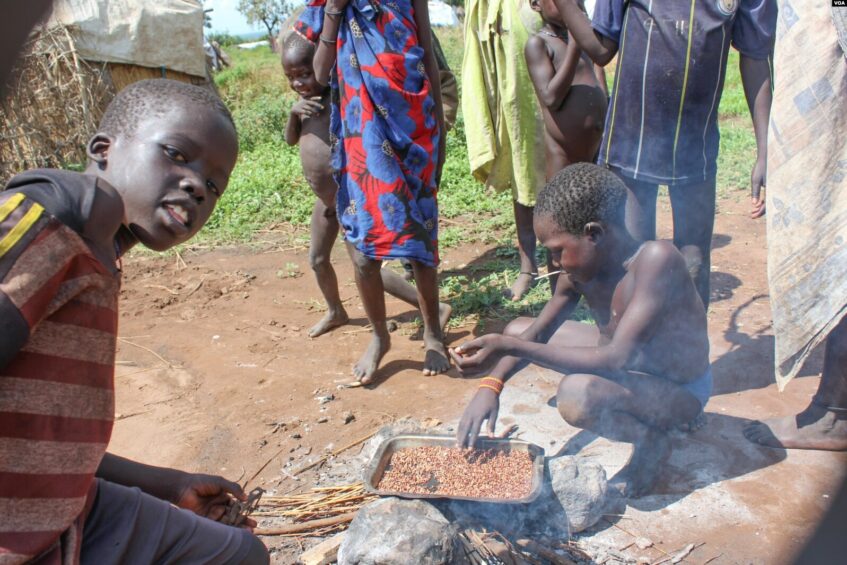You are here: Home | Economy | Humanitarian | News | 5.78 million South Sudanese suffering inflation-induced hunger: OCHA

Children roast pesticide treated sorghum as source of food at Naipuru camp for internal displaced persons in Jebel Boma County. (John Tanza/VOA)
South Sudan’s currency depreciation has caused severe hunger for around 6 million people between December 2023 and March 2024 as food prices rise by 19 percent in the country, the United Nations humanitarian agency said.
UN Office for Coordination of Humanitarian Affairs said some 5.78 million people were projected to be at risk of experiencing high levels of severe food insecurity during that period.
The agency further noted that nearly 600,000 people have been registered crossing into South Sudan from Sudan since the beginning of conflict on 15th April 2023.
In February alone, 43,988 people were registered entering South Sudan at an average daily arrival of 1,517 persons, OCHA said.
“People arriving were in need of clean water, food, shelter and health care. Overcrowding and unhygienic living conditions were reported in Bulukat and Renk transit centres in Upper Nile State,” it said in a statement.
– Weakening currency –
South Sudan’s currency drastically weakened against the United States dollar between February and March, triggering a sharp increase in commodity prices across the country.
The situation is blamed on dwindling revenue due to the impact of the war in Sudan and the Red Sea blockade on the country’s precious oil export.
This has induced economic hardships that leave the government struggling to pay civil servants salaries, as the public workforce goes for seven months without its dues.
The Central Bank exchange rate posted on Monday, March 25, 2024, shows one dollar trading at an average of 1,581 South Sudanese pounds, while in the black market, one dollar cost around 2,000 pounds.
The Sudanese government on March 16, declared force majeure, saying it is unable to facilitate the transportation of South Sudan crude oil through the Jabalayn-Port Sudan Pipeline, citing interruptions from the ongoing conflict.
Khartoum invoked the force majeure to suspend its obligations to deliver crude oil through the BAPCO Transportation System to the Bashayer 2 Marine Terminal.
This essentially means that Sudan is invoking a contractual clause that exempts it from fulfilling its obligations under the agreement due to unforeseen circumstances or events beyond its control.
By declaring force majeure, Sudan seeks legal protection from any potential liability for failing to meet its contractual commitments under the oil agreement.
– Food subsidies –
The National Ministry of Trade and Industry responded to the food crisis by opening six subsidized food stores selling maize in Juba to enable the public to afford food at cheaper price.
Trade ministry undersecretary, Kuol Daniel Ayulo, said the same initiative would also be extended to the states in a few weeks’ time, to enable every household to afford the cost of living.
But an economist slammed the “short term” economic relief initiative, suggesting that the only way to ultimately beat inflation is providing a stable environment and boosting agriculture.
Dr. Abraham Maliet said the purchase of food items is unsustainable and a drop in the ocean and recommended the procurement of farming tools and equipment to support agricultural production.
Support Eye Radio, the first independent radio broadcaster of news, information & entertainment in South Sudan.
Make a monthly or a one off contribution.
Copyright 2024. All rights reserved. Eye Radio is a product of Eye Media Limited.